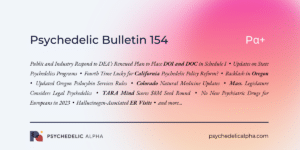Psychedelic Sector News
DEA Moves to Add 5 Psychedelic Tryptamines to Schedule I
The U.S. Drug Enforcement Administration (DEA) has announced its intention to place 5 tryptamine hallucinogens in schedule I of the Controlled Substances Act, noting that they “share structural and pharmacological similarities with several schedule I tryptamine hallucinogens” including DMT and psilocyn.
The five tryptamines are as follows:
- 4-Hydroxy-N,N-diisopropyltryptamine (4-OH-DiPT),
- 5-Methoxy-alphamethyltryptamine (5-MeO-AMT),
- N-Isopropyl-5-Methoxy-N-Methyltryptamine (5-MeO-MiPT),
- N,N-Diethyl-5-methoxytryptamine (5-MeO-DET), and
- N,N-Diisopropyltryptamine (DiPT).
A few weeks ago we covered Field Trip’s lead candidate, FT-104, which is a prodrug of 4-HO-DiPT. Given that this is a prodrug of 4-OH-DiPT, the DEA’s move to schedule the tryptamine may cause problems for Field Trip. At the least, it will “add some paperwork and delays to their efforts in the US,” writes Matt Baggott.
Interestingly, the Federal Register entry announcing the proposal explains that the DEA gathered data on the five tryptamines in 2008, with HHS submitting a scheduling recommendation to the DEA In 2012.
It’s curious, then, that it’s taken nearly ten years for this decision to be made. Could it be a result of the resurgent interest in psychedelic medicine, as evidenced by Field Trip’s FT-104, for example?
“Despite apparent progress, the gears of prohibition continue to grind,” Hamilton Morris wrote on Twitter.
***
A note from Editor-at-Large Graham Pechenik on this development
Last Thursday, at a psychedelics workshop co-hosted by the National Institute on Drug Abuse (NIDA) and the National Institute of Mental Health, NIDA Director Dr. Nora Volkow commented that “with all the attention that the psychedelic drugs have attracted, the train has left the station” and “people are going to start to use” them. Just a day later on January 14th, the U.S. Drug Enforcement Agency (DEA) proposed to add five new psychedelic tryptamines (4-HO-DiPT, 5-MeO-AMT, 5-MeO-MiPT, 5-MeO-DET, and DiPT) to Schedule I—based on a 2012 evaluation by Health and Human Services—on grounds that each drug has a high potential for abuse, no currently accepted medical use, and a lack of accepted safety for use.
The decision to put these substances on Schedule I based on a 2012 evaluation that showed little signs of abuse is questionable and troubling. Not only will scheduling make these five tryptamines more difficult to access for research, but DEA’s decision indicates how it may handle other psychedelic compounds with medical and scientific usefulness going forward. DEA’s reasoning sets bad precedent and policy.
Many have reached out with concerns about DEA’s decision to schedule these substances and how it may affect their research. If you have any questions or concerns about DEA’s decision or would be interested in joining a petition for a hearing, please e-mail DEAhearing@calyxlaw.com. We’re working on one now.
COMPASS Pathways Seeks LSD Patents
It has become apparent that COMPASS Pathways, via its acquisition of Matthias Grill’s IP portfolio (housed in MiHKAL GmbH), is pursuing patents related to LSD production methods, derivatives and methods of treatment. Our Editor-at-Large, Graham Pechenik, broke the news via Twitter.
Thus far the company has focused on psilocybin, with the development of LSD largely being the remit of MindMed. This latest patent application publication suggests the company is not only seeking to diversify itself across new indications for its synthetic psilocybin (COMP360), but other molecules entirely.
Eleusis Aims to Raise $288m Via SPAC Amid Tough Market Conditions
The London and New York headquartered company is seeking to develop its ELE-Psilo candidate, which delivers psilocin via intravenous infusion. The company hopes this will offer more consistent and controllable therapeutic effects to patients, achievable in a shorter period of time (around 2 hours) versus others’ psychedelic-assisted therapies.
Founded in 2013, Eleusis was one of the earlier companies to explore psychedelic medicine. However, the company has been quiet for the better part of a year, and appears to have streamlined its drug development pipeline to focus on ELE-Psilo, which it expects will enter a Phase 1 trial next quarter.
If all goes to plan, the merger (expected to close in Q2 or Q3) would value the company at $446m, with Eleusis applying to list on Nasdaq under ELEU. It’s a tricky market, though: both for SPACs and psychedelics.
Read more in the company’s press release, and pitch deck.
Other Company News
- Algernon files for clinical trial and ethics approval for Phase 1 DMT human stroke study;
- Awakn signs MOU with MAPS;
- BetterLife obtains positive preclinical data; receives FDA response on pre-IND application;
- COMPASS Pathways shares survey showing two thirds of physicians surveyed believe psilocybin therapy has potential benefit for patients with TRD:
- Entheon Biomedical files preliminary shelf prospectus; announces agreement with Psychedelics Today;
- MindMed enrolls first participant in study of session monitoring system;
- Mydecine signs LOI with The Newly Institute to provide PAP under Health Canada’s SAP;
- Numinus announces key milestones in MAPS-sponsored MDMA-AT for PTSD trial; reports Q1 2022 results;
- Optimi Health files provisional patent on natural psilocybin combined drug delivery and extraction formulations;
- PharmaDrug engages Octagon Media for investor marketing campaign;
- Psygen receives Dealer’s Licence from Health Canada;
- Red Light Holland to collaborate with Washington advocacy group;
- Revive Therapeutics provides update on psilocybin pharmaceutical programs.
Weekend Reading
Weekly Bulletins
Join our newsletter to have our Weekly Bulletin delivered to your inbox every Friday evening. We summarise the week’s most important developments and share our Weekend Reading suggestions.
Live Updates
Join us on Twitter for the latest news and analysis.
Other Channels
You can also find us on LinkedIn, Instragram, and Facebook.






